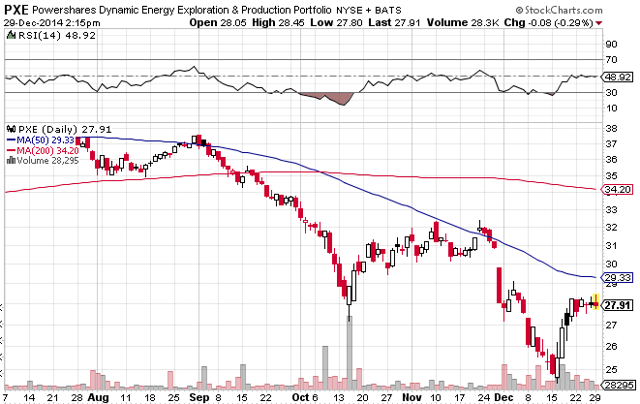Scalper1 News
 Summary Canada and Mexico are competiting to sell to refiners in the Gulf Coast. Greater competition could cause more discounts to the benefit of refiners. An energy-sector ETF with a heavy refiner exposure. As Canada and Mexico compete for oil processing along the U.S. Gulf Coast, West Texas Intermediate oil prices may remain depressed, but oil refiners and sector-related exchange traded funds could come out on top. The new Seaway Twin pipeline could double the amount of heavy Canadian crude oil to the Gulf, pressuring crude from Mexico and Venezuela that have traditionally fed refineries along Texas and Louisiana, Bloomberg reports. The greater competition could cut down costs for oil refiners. For instance, in December, state-owned Petroleos Mexicanos raised its discount for U.S. buyers by the most since August 2013. Now, Valero Energy (NYSE: VLO ) and Marathon Petroleum Corp (NYSE: MPC ), which invested in equipment to refine heavy crude, will benefit the most from the increased Canadian supply. While there are no specific oil refiner ETFs available, the PowerShares Dynamic Energy Exploration & Production Portfolio (NYSEARCA: PXE ) is a refiner heavy ETF , with components like the Occidental Petroleum (NYSE: OXY ), which like Exxon (NYSE: XOM ) and Chevron (NYSE: CVX ) is an integrated oil firm and has refining operations, and PXE features four pure play refiners among its top 10 holdings for a combined 18% of the ETF’s overall holdings. Specifically, VLO is 5.2% and MPC is 5.0%. The U.S. Gulf Coast remains the go-to area for heavy crude oil processing in the Americas. Consequently, Latin American countries will fight to maintain their spot in the U.S. “U.S. refineries built out their capacity to run heavy barrels,” John Auers, executive vice president at Dallas-based Turner Mason & Co, said in the Bloomberg article. “Refineries in the rest of world aren’t built to run heavy barrels.” Consequently, in an attempt to stay competitive, Mexico’s discount to refineries and its reliance on oil revenue could also weigh on the iShares MSCI Mexico Capped ETF (NYSEARCA: EWW ) . While EWW has no exposure to the energy sector, oil sales still accounts for over 25% of Mexico’s government revenue . WTI crude was down 2.5% Monday to $53.4 per barrel. The United States Oil Fund (NYSEARCA: USO ) , which tracks West Texas Intermediate crude oil futures, has plunged 40.9% over the past three months. PowerShares Dynamic Energy Exploration & Production Portfolio (click to enlarge) Scalper1 News
Summary Canada and Mexico are competiting to sell to refiners in the Gulf Coast. Greater competition could cause more discounts to the benefit of refiners. An energy-sector ETF with a heavy refiner exposure. As Canada and Mexico compete for oil processing along the U.S. Gulf Coast, West Texas Intermediate oil prices may remain depressed, but oil refiners and sector-related exchange traded funds could come out on top. The new Seaway Twin pipeline could double the amount of heavy Canadian crude oil to the Gulf, pressuring crude from Mexico and Venezuela that have traditionally fed refineries along Texas and Louisiana, Bloomberg reports. The greater competition could cut down costs for oil refiners. For instance, in December, state-owned Petroleos Mexicanos raised its discount for U.S. buyers by the most since August 2013. Now, Valero Energy (NYSE: VLO ) and Marathon Petroleum Corp (NYSE: MPC ), which invested in equipment to refine heavy crude, will benefit the most from the increased Canadian supply. While there are no specific oil refiner ETFs available, the PowerShares Dynamic Energy Exploration & Production Portfolio (NYSEARCA: PXE ) is a refiner heavy ETF , with components like the Occidental Petroleum (NYSE: OXY ), which like Exxon (NYSE: XOM ) and Chevron (NYSE: CVX ) is an integrated oil firm and has refining operations, and PXE features four pure play refiners among its top 10 holdings for a combined 18% of the ETF’s overall holdings. Specifically, VLO is 5.2% and MPC is 5.0%. The U.S. Gulf Coast remains the go-to area for heavy crude oil processing in the Americas. Consequently, Latin American countries will fight to maintain their spot in the U.S. “U.S. refineries built out their capacity to run heavy barrels,” John Auers, executive vice president at Dallas-based Turner Mason & Co, said in the Bloomberg article. “Refineries in the rest of world aren’t built to run heavy barrels.” Consequently, in an attempt to stay competitive, Mexico’s discount to refineries and its reliance on oil revenue could also weigh on the iShares MSCI Mexico Capped ETF (NYSEARCA: EWW ) . While EWW has no exposure to the energy sector, oil sales still accounts for over 25% of Mexico’s government revenue . WTI crude was down 2.5% Monday to $53.4 per barrel. The United States Oil Fund (NYSEARCA: USO ) , which tracks West Texas Intermediate crude oil futures, has plunged 40.9% over the past three months. PowerShares Dynamic Energy Exploration & Production Portfolio (click to enlarge) Scalper1 News
Scalper1 News